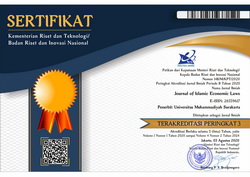Zakat Digitalization: Effectiveness of Zakat Management During Covid-19 Pandemic
DOI:
https://doi.org/10.23917/jisel.v4i1.12442Keywords:
Zakat Digitalization, Zakat Management, SWOT, Covid-19 PandemicAbstract
This study aims to analyze the role of digitalization in zakat management during the Covid-19 pandemic. Furthermore, it also aims to analyze the strengths, weaknesses, opportunities, and threats of zakat digitization in Indonesia. The method used in this research is a qualitative method with a literature study and a SWOT analysis approach. Literature shows that using digital platforms to collect, manage, and distribute zakat is very useful, especially during the Covid-19 pandemic, because it provides much convenience for its users. However, digital platforms have weaknesses and threats both for zakat institutions and for muzaki and mustahik. To overcome these threats and weaknesses, zakat institutions can make various strategies by utilizing existing strengths and opportunities. This strategy is made so that the collection and distribution of zakat funds can be appropriately optimized and have a tremendous impact on the community’s welfare, especially for the poor who are affected by Covid-19.
Downloads
Downloads
Submitted
Published
How to Cite
Issue
Section
License
Copyright (c) 2021 Journal of Islamic Economic Laws

This work is licensed under a Creative Commons Attribution-ShareAlike 4.0 International License.



















